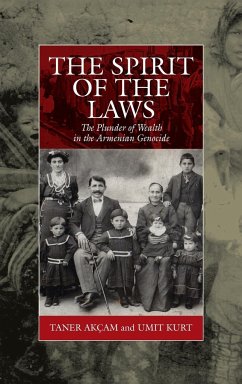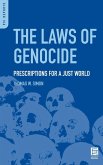- Gebundenes Buch
- Merkliste
- Auf die Merkliste
- Bewerten Bewerten
- Teilen
- Produkt teilen
- Produkterinnerung
- Produkterinnerung
Pertinent to contemporary demands for reparations from Turkey is the relationship between law and property in connection with the Armenian Genocide. This book examines the confiscation of Armenian properties during the genocide and subsequent attempts to retain seized Armenian wealth. Through the close analysis of laws and treaties, it reveals that decrees issued during the genocide constitute central pillars of the Turkish system of property rights, retaining their legal validity, and although Turkey has acceded through international agreements to return Armenian properties, it continues to…mehr
Andere Kunden interessierten sich auch für
![Spirit of the Laws Spirit of the Laws]() Umit KurtSpirit of the Laws38,99 €
Umit KurtSpirit of the Laws38,99 €![The Laws of Genocide The Laws of Genocide]() Thomas SimonThe Laws of Genocide85,99 €
Thomas SimonThe Laws of Genocide85,99 €![The Spirit Of The Laws The Spirit Of The Laws]() The Spirit Of The Laws40,99 €
The Spirit Of The Laws40,99 €![The Spirit of Laws The Spirit of Laws]() Charles Baron De MontesquieuThe Spirit of Laws51,99 €
Charles Baron De MontesquieuThe Spirit of Laws51,99 €![The Spirit of Laws The Spirit of Laws]() Charles Baron De MontesquieuThe Spirit of Laws30,99 €
Charles Baron De MontesquieuThe Spirit of Laws30,99 €![The Spirit of the Laws The Spirit of the Laws]() Charles De MontesquieuThe Spirit of the Laws23,99 €
Charles De MontesquieuThe Spirit of the Laws23,99 €![The Spirit of the Laws The Spirit of the Laws]() Charles De Secondat MontesquieuThe Spirit of the Laws23,99 €
Charles De Secondat MontesquieuThe Spirit of the Laws23,99 €-
-
-
Pertinent to contemporary demands for reparations from Turkey is the relationship between law and property in connection with the Armenian Genocide. This book examines the confiscation of Armenian properties during the genocide and subsequent attempts to retain seized Armenian wealth. Through the close analysis of laws and treaties, it reveals that decrees issued during the genocide constitute central pillars of the Turkish system of property rights, retaining their legal validity, and although Turkey has acceded through international agreements to return Armenian properties, it continues to refuse to do so. The book demonstrates that genocides do not depend on the abolition of the legal system and elimination of rights, but that, on the contrary, the perpetrators of genocide manipulate the legal system to facilitate their plans.
Produktdetails
- Produktdetails
- War and Genocide Nr.21
- Verlag: Berghahn Books
- Seitenzahl: 220
- Erscheinungstermin: 1. Juli 2015
- Englisch
- Abmessung: 235mm x 157mm x 17mm
- Gewicht: 478g
- ISBN-13: 9781782386230
- ISBN-10: 1782386238
- Artikelnr.: 42487089
- War and Genocide Nr.21
- Verlag: Berghahn Books
- Seitenzahl: 220
- Erscheinungstermin: 1. Juli 2015
- Englisch
- Abmessung: 235mm x 157mm x 17mm
- Gewicht: 478g
- ISBN-13: 9781782386230
- ISBN-10: 1782386238
- Artikelnr.: 42487089
Umit Kurt received his PhD in History from Clark University in 2016, and his MA in European Studies from Sabanci University in 2008. He was a visiting professor in the Armenian Studies Program at California State University in 2015-16, and a post-doctoral fellow at CMES, Harvard University in 2016-17. Currently, he is the Polonsky Fellow at the Van Leer Jerusalem Institute, Polonsky Academy for Advanced Studies.
Introduction
Chapter 1. The Laws and Decrees of the Committee of Union and Progress
Period
* The Decrees and Regulations of 17, 30 and 31 May 1915
* The Regulation of 10 June 1915
* The Temporary Law of 26 September 1915 and the Regulation of 8
November 1915
* A Brief Evaluation
Chapter 2. The Armistice Period and the Returning Armenians
* The First Ones Returning from Deportation
* 12 January 1920: The Ittihadist Laws Are Annulled
* A Brief Evaluation
* The Treaty of Sèvres of 10 August 1920
* The Prohibition against the Return of Greeks and Armenians Staying
Outside of Turkey
* The Articles of Law Used to Prevent Their Return
* Policies to Obstruct Repatriation
* The Prohibition of Domestic Travel and Migration
* A Brief Evaluation
Chapter 3. The Turkish Republic Prior to Lausanne
* The First Laws and Regulations of the Turkish Grand National Assembly
* The 20 April 1922 Abandoned Properties Law
* The Regulations of November to December 1922
* Regulations Relevant to Istanbul
* The 14 September 1922 "Abrogation of the Property Regulation"
* Why Was There a Return to the Ittihadist Laws of the Genocide?
* The Plunder of Izmir and the Independence Tribunals
* Return to the Ittihadist Mentality: The 15 April Law and 29 April
Regulation of 1923
* A Brief Evaluation
* Abandoned Properties and National Tax Obligations (Tekalif-i Milliye
)
Chapter 4. The Treaty of Lausanne: A Turning Point
* The Abandoned Properties Question in the Negotiations and Treaty
* Mass and Individual Repatriations and the Armenian Homeland
* A Plan to Expel the Armenian Population
* The Question of the Belongings Which Were Left Behind
* The Amnesty: Draft Proposal and Final Form
* The Lausanne Regulations: The Question of Nationality
* The Lausanne Regulations: Property, Rights and Interests, or, The
Issue of Compensation
* A Brief Evaluation of Lausanne
Chapter 5. After Lausanne: The Armenians Remaining Outside of Turkey
* The Treaties of Alexandrapol (Gyumri), Kars and Moscow
* Turkey-France: A Pair of Treaties
* The 25 October 1934 Turkey-US Compensation Treaty
* An Interim Note on the US Compensation Treaty
* The International Commission and Mixed Arbitral Tribunals
Chapter 6. Turkey after Lausanne: Virtually Raising a Wall around Its
Borders Like a Fortress
* Armerican Armenians Are Not Permitted to Enter Turkey
* The Return of the Armenians: A Question of the Honor and Pride of the
State
* "To Allow Their Return...Means to Waste the Blood We Spilled"
* The Legal Vacuum Created by Lausanne on Repatriation
* The Travel Regulation: Bans on Entry into the Country and Domestic
Travel
* Prohibitions on Domestic Travel
* Passport Laws
Chapter 7. Domestic Legal Regulations During the Republican Period
* The First Adjustments
* The 13 June 1926 Regulation
* 1928: The Distribution of Title Deeds and the Transfer of Revenue to
the Treasury Begin
* The 22 April 1963 Constitutional Court Decision
* The Citizenship Laws of 1928 and 1964
* Those Removed from Citizenship and the Liquidation of Their
Properties
* The Abandoned Properties Laws and the Present Situation
* The 1983 and 2001 Circulars of the General Directorate of Land
Registry and Cadaster
* Profound Fear: Title Deed Registries
Conclusion
Bibliography
Index
Chapter 1. The Laws and Decrees of the Committee of Union and Progress
Period
* The Decrees and Regulations of 17, 30 and 31 May 1915
* The Regulation of 10 June 1915
* The Temporary Law of 26 September 1915 and the Regulation of 8
November 1915
* A Brief Evaluation
Chapter 2. The Armistice Period and the Returning Armenians
* The First Ones Returning from Deportation
* 12 January 1920: The Ittihadist Laws Are Annulled
* A Brief Evaluation
* The Treaty of Sèvres of 10 August 1920
* The Prohibition against the Return of Greeks and Armenians Staying
Outside of Turkey
* The Articles of Law Used to Prevent Their Return
* Policies to Obstruct Repatriation
* The Prohibition of Domestic Travel and Migration
* A Brief Evaluation
Chapter 3. The Turkish Republic Prior to Lausanne
* The First Laws and Regulations of the Turkish Grand National Assembly
* The 20 April 1922 Abandoned Properties Law
* The Regulations of November to December 1922
* Regulations Relevant to Istanbul
* The 14 September 1922 "Abrogation of the Property Regulation"
* Why Was There a Return to the Ittihadist Laws of the Genocide?
* The Plunder of Izmir and the Independence Tribunals
* Return to the Ittihadist Mentality: The 15 April Law and 29 April
Regulation of 1923
* A Brief Evaluation
* Abandoned Properties and National Tax Obligations (Tekalif-i Milliye
)
Chapter 4. The Treaty of Lausanne: A Turning Point
* The Abandoned Properties Question in the Negotiations and Treaty
* Mass and Individual Repatriations and the Armenian Homeland
* A Plan to Expel the Armenian Population
* The Question of the Belongings Which Were Left Behind
* The Amnesty: Draft Proposal and Final Form
* The Lausanne Regulations: The Question of Nationality
* The Lausanne Regulations: Property, Rights and Interests, or, The
Issue of Compensation
* A Brief Evaluation of Lausanne
Chapter 5. After Lausanne: The Armenians Remaining Outside of Turkey
* The Treaties of Alexandrapol (Gyumri), Kars and Moscow
* Turkey-France: A Pair of Treaties
* The 25 October 1934 Turkey-US Compensation Treaty
* An Interim Note on the US Compensation Treaty
* The International Commission and Mixed Arbitral Tribunals
Chapter 6. Turkey after Lausanne: Virtually Raising a Wall around Its
Borders Like a Fortress
* Armerican Armenians Are Not Permitted to Enter Turkey
* The Return of the Armenians: A Question of the Honor and Pride of the
State
* "To Allow Their Return...Means to Waste the Blood We Spilled"
* The Legal Vacuum Created by Lausanne on Repatriation
* The Travel Regulation: Bans on Entry into the Country and Domestic
Travel
* Prohibitions on Domestic Travel
* Passport Laws
Chapter 7. Domestic Legal Regulations During the Republican Period
* The First Adjustments
* The 13 June 1926 Regulation
* 1928: The Distribution of Title Deeds and the Transfer of Revenue to
the Treasury Begin
* The 22 April 1963 Constitutional Court Decision
* The Citizenship Laws of 1928 and 1964
* Those Removed from Citizenship and the Liquidation of Their
Properties
* The Abandoned Properties Laws and the Present Situation
* The 1983 and 2001 Circulars of the General Directorate of Land
Registry and Cadaster
* Profound Fear: Title Deed Registries
Conclusion
Bibliography
Index
Introduction
Chapter 1. The Laws and Decrees of the Committee of Union and Progress
Period
* The Decrees and Regulations of 17, 30 and 31 May 1915
* The Regulation of 10 June 1915
* The Temporary Law of 26 September 1915 and the Regulation of 8
November 1915
* A Brief Evaluation
Chapter 2. The Armistice Period and the Returning Armenians
* The First Ones Returning from Deportation
* 12 January 1920: The Ittihadist Laws Are Annulled
* A Brief Evaluation
* The Treaty of Sèvres of 10 August 1920
* The Prohibition against the Return of Greeks and Armenians Staying
Outside of Turkey
* The Articles of Law Used to Prevent Their Return
* Policies to Obstruct Repatriation
* The Prohibition of Domestic Travel and Migration
* A Brief Evaluation
Chapter 3. The Turkish Republic Prior to Lausanne
* The First Laws and Regulations of the Turkish Grand National Assembly
* The 20 April 1922 Abandoned Properties Law
* The Regulations of November to December 1922
* Regulations Relevant to Istanbul
* The 14 September 1922 "Abrogation of the Property Regulation"
* Why Was There a Return to the Ittihadist Laws of the Genocide?
* The Plunder of Izmir and the Independence Tribunals
* Return to the Ittihadist Mentality: The 15 April Law and 29 April
Regulation of 1923
* A Brief Evaluation
* Abandoned Properties and National Tax Obligations (Tekalif-i Milliye
)
Chapter 4. The Treaty of Lausanne: A Turning Point
* The Abandoned Properties Question in the Negotiations and Treaty
* Mass and Individual Repatriations and the Armenian Homeland
* A Plan to Expel the Armenian Population
* The Question of the Belongings Which Were Left Behind
* The Amnesty: Draft Proposal and Final Form
* The Lausanne Regulations: The Question of Nationality
* The Lausanne Regulations: Property, Rights and Interests, or, The
Issue of Compensation
* A Brief Evaluation of Lausanne
Chapter 5. After Lausanne: The Armenians Remaining Outside of Turkey
* The Treaties of Alexandrapol (Gyumri), Kars and Moscow
* Turkey-France: A Pair of Treaties
* The 25 October 1934 Turkey-US Compensation Treaty
* An Interim Note on the US Compensation Treaty
* The International Commission and Mixed Arbitral Tribunals
Chapter 6. Turkey after Lausanne: Virtually Raising a Wall around Its
Borders Like a Fortress
* Armerican Armenians Are Not Permitted to Enter Turkey
* The Return of the Armenians: A Question of the Honor and Pride of the
State
* "To Allow Their Return...Means to Waste the Blood We Spilled"
* The Legal Vacuum Created by Lausanne on Repatriation
* The Travel Regulation: Bans on Entry into the Country and Domestic
Travel
* Prohibitions on Domestic Travel
* Passport Laws
Chapter 7. Domestic Legal Regulations During the Republican Period
* The First Adjustments
* The 13 June 1926 Regulation
* 1928: The Distribution of Title Deeds and the Transfer of Revenue to
the Treasury Begin
* The 22 April 1963 Constitutional Court Decision
* The Citizenship Laws of 1928 and 1964
* Those Removed from Citizenship and the Liquidation of Their
Properties
* The Abandoned Properties Laws and the Present Situation
* The 1983 and 2001 Circulars of the General Directorate of Land
Registry and Cadaster
* Profound Fear: Title Deed Registries
Conclusion
Bibliography
Index
Chapter 1. The Laws and Decrees of the Committee of Union and Progress
Period
* The Decrees and Regulations of 17, 30 and 31 May 1915
* The Regulation of 10 June 1915
* The Temporary Law of 26 September 1915 and the Regulation of 8
November 1915
* A Brief Evaluation
Chapter 2. The Armistice Period and the Returning Armenians
* The First Ones Returning from Deportation
* 12 January 1920: The Ittihadist Laws Are Annulled
* A Brief Evaluation
* The Treaty of Sèvres of 10 August 1920
* The Prohibition against the Return of Greeks and Armenians Staying
Outside of Turkey
* The Articles of Law Used to Prevent Their Return
* Policies to Obstruct Repatriation
* The Prohibition of Domestic Travel and Migration
* A Brief Evaluation
Chapter 3. The Turkish Republic Prior to Lausanne
* The First Laws and Regulations of the Turkish Grand National Assembly
* The 20 April 1922 Abandoned Properties Law
* The Regulations of November to December 1922
* Regulations Relevant to Istanbul
* The 14 September 1922 "Abrogation of the Property Regulation"
* Why Was There a Return to the Ittihadist Laws of the Genocide?
* The Plunder of Izmir and the Independence Tribunals
* Return to the Ittihadist Mentality: The 15 April Law and 29 April
Regulation of 1923
* A Brief Evaluation
* Abandoned Properties and National Tax Obligations (Tekalif-i Milliye
)
Chapter 4. The Treaty of Lausanne: A Turning Point
* The Abandoned Properties Question in the Negotiations and Treaty
* Mass and Individual Repatriations and the Armenian Homeland
* A Plan to Expel the Armenian Population
* The Question of the Belongings Which Were Left Behind
* The Amnesty: Draft Proposal and Final Form
* The Lausanne Regulations: The Question of Nationality
* The Lausanne Regulations: Property, Rights and Interests, or, The
Issue of Compensation
* A Brief Evaluation of Lausanne
Chapter 5. After Lausanne: The Armenians Remaining Outside of Turkey
* The Treaties of Alexandrapol (Gyumri), Kars and Moscow
* Turkey-France: A Pair of Treaties
* The 25 October 1934 Turkey-US Compensation Treaty
* An Interim Note on the US Compensation Treaty
* The International Commission and Mixed Arbitral Tribunals
Chapter 6. Turkey after Lausanne: Virtually Raising a Wall around Its
Borders Like a Fortress
* Armerican Armenians Are Not Permitted to Enter Turkey
* The Return of the Armenians: A Question of the Honor and Pride of the
State
* "To Allow Their Return...Means to Waste the Blood We Spilled"
* The Legal Vacuum Created by Lausanne on Repatriation
* The Travel Regulation: Bans on Entry into the Country and Domestic
Travel
* Prohibitions on Domestic Travel
* Passport Laws
Chapter 7. Domestic Legal Regulations During the Republican Period
* The First Adjustments
* The 13 June 1926 Regulation
* 1928: The Distribution of Title Deeds and the Transfer of Revenue to
the Treasury Begin
* The 22 April 1963 Constitutional Court Decision
* The Citizenship Laws of 1928 and 1964
* Those Removed from Citizenship and the Liquidation of Their
Properties
* The Abandoned Properties Laws and the Present Situation
* The 1983 and 2001 Circulars of the General Directorate of Land
Registry and Cadaster
* Profound Fear: Title Deed Registries
Conclusion
Bibliography
Index








